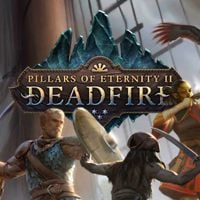Pillars of Eternity 2: Combat Guide
A large portion of Pillars of Eternity 2 Deadfire comprises battles, which can prove quite challenging. On your way, you will have to face numerous characters and creatures. Below, you can find a set of the most important information regarding combat:
- User Interface - what is worth checking?
- Combat preparation - best party combination, efficient combat tactics, AI and lots of potions (drugs, bombs and magical scrolls are also handy).
- Interaction scenes before combat - how you can avoid combat or surprise your enemy?
- Combat process - list of measures on how to achieve victory?
- Healing your party during combat - aiding and healing group injuries.
Fast travel to tips:
- User combat interface
- Preparing for combat
- Scripted interactions before the battle
- The Course of Battle
- Healing the party after the combat
- A handful of combat tips:
User combat interface

- Sustained injuries. When your characters sustain damage, a red color is going to appear in their portraits. The redder it is, the closer they are to being knocked out. When they lose all their health points, they fall unconscious - should you win the battle, the character comes back to life, however, it receives a negative injury status and has his (or her) maximum health decreased by 25%. After a character is defeated 4 times in a row, he or she dies permanently. Resting resets characters' health.
- Quick access bar. After you click on a character's portrait, you reveal the quick access bar on which there are character's abilities, equipped weapons, items he or she can use, etc.
- Pause. During the pause (by default, to pause by pressing the space bar) the time stops. This proves very useful during the real-time battles. You can pause the game and give orders to your characters.
- Target information. After you hover the mouse over an opponent you will see detailed information regarding this enemy, including health points, abilities, resistance, and other important stats.
- Opponents. The enemies are indicated by a red circle. The example above shows that enemy support / ranged units are deployed in the back of the enemy formation. Try to eliminate them first, as they might cause trouble.
Preparing for combat

Choose the right companions for the party - combat preparations should start from a scratch. If your team is not well-balanced and universal, you may have problems with harder opponents or large groups of enemies.
The recommended combination for beginners is two short-fought characters, two distance attackers and one support character:
- Close-range/melee combat characters - in this case you need one person to take the most of the damage (tank) and the other one focused on the attack with high dps. In the first role (tank) fighter or paladin in heavy armor, with shield and ability to pull enemies from your characters with little health (e.g. Knock Down or fighter's Charge), works well. As the second character to fight close up, a barbarian or priest - a character classes with many abilities that deal considerable damage will fit perfectly.
- Range combat characters - mage is the foundation of every team. This class has plenty of spells that deal a lot of damage to single enemies like Fireball or even more powerful area of effect spells like Fan of Flames. The second "ranged" character should be a hunter - the hunter deals considerable damage to individual targets and also has an animal companion which is an additional member of the team.
- Support characters - this is a character which is holding the back and is not likely to deal too much damage, but his/her role is extremely important in the team. A monk or bard is great choice here - invest in healing spells like Restore and debuffs like Interdiction. The form of support must constantly help the other members of the group, restoring their health or throwing negative spells at enemies.
Where can I recruit team members? Visit the FAQ page "How to quickly assemble the party?" .
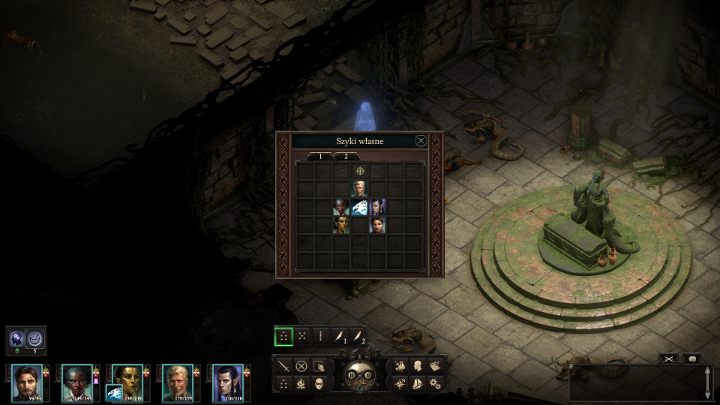
Create your own battle formation - another important issue is to create the right battle formation for your team to move around. A well-chosen formation allows you to lead melee oriented characters together at the front and hide vulnerable ones with less health at the back - this will reduce access to your party members fighting from a distance. Of course, the opponent may surprise you, but the right formation reduces the chance.
How do I create my own formation? Just click on the "Battle Formation" icon in the left zone of the icons of the interface. That will open a window where you can select three basic formation patterns (square, "X" and linear), but the other two slots are for player-defined patterns. Clicking on them will open a window visible in the picture above - here you can set the position of your heroes freely.
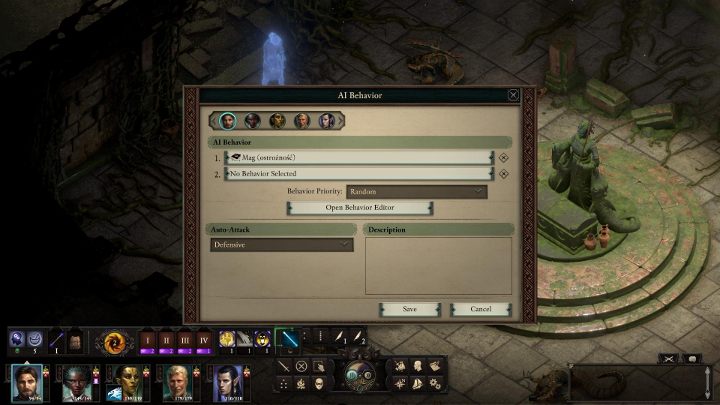
AI Behavior of your team - the game allows you to adjust the actions of your companions to the specific conditions. This means you don't have to control them all the time - some actions will be activated automatically. Actually, the hero can follow the pre-set script throughout the entire battle, but it is not a recommended solution.
How do I set up my companions behavior? Click on the portrait and then right-click on the sprocket head icon to open the window shown in the picture above. The creators have prepared two ready-made behaviors - the "aggression" and "caution". Besides, you can create your own behavior by clicking on the button "Open Behavior Editor". An extensive wizard allows you to adjust a specific condition (e.g. low amount of health) to a specific action (e.g. casting a specific spell).
You can also change the automatic attack options. In this case, you can only use the ready-made solutions:
- Passive attitude - the character will not attack automatically regardless of the circumstances.
- Self-defense - The character will not move into combat unless attacked by an opponent.
- Defense - A character will automatically attack nearby enemies, regardless of whether he or she is attacked.
- Aggression - A character will automatically attack visible enemies, regardless of whether he or she is attacked.
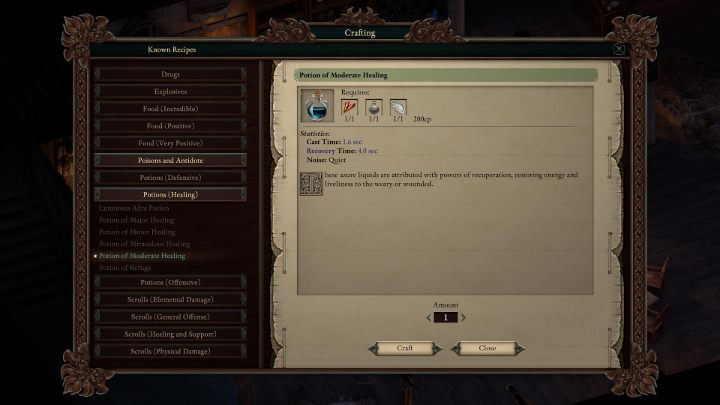
Ensure appropriate equipment - potions (healing and buffing statistics) are a must, but you can also buy something more complicated. Magic scrolls will let you deal additional damage debuff the opponent, whereas narcotics will boot you into action, but you will have to bear the negative withdrawal consequences later on (drops in certain statistics). All of these can be found while exploring the game world, buy from a merchant or craft yourself - the Crafting is on the left side of the screen. For crafting, you need, of course, ingredients that you can either find in the game world, or buy from NPCs.
Below, you will find some useful items that are easy to come by (they are affordable, often appear in various locations or require common ingredients to craft):
- Potion of Minor Regeneration
- Potion of Bulwark against the Elements - buffs defense from all types of attacks.
- Scroll of Minor Regeneration
- Flaming bomb - blinds and deals damage from fire.
Scripted interactions before the battle
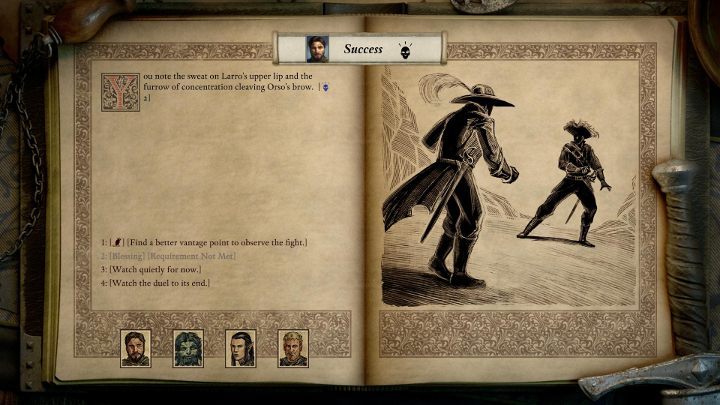
Sometimes, battles are preceded by scripted interactions - you can then influence the outcome of the battle. still before it happens. Available options depend on the current situation and your character's abilities. You can, for example:
- Surprise the opponent - this option lets you infiltrate enemy lines and you start the battle close to the opponent - your entire party is then in stealth mode, so you can take advantage of the element of surprise.
- Intimidate, use diplomacy or bribe - sometimes, it is possible to avoid the battle altogether. You may be able to intimidate the opponent, convince him not to fight with you, or simply you can grease him up.
- Flee the battlefield - you can also retreat from the battle.
The availability of options, and probability of their success is governed by the following passive abilities:
Nazwa umiejetnosci | Description |
Bluff | It affects the ability to bluff during conversation. |
Diplomacy | Useful for negotiations and while solving various conflicts. |
History | Describes your awareness of history and of various races in the world. |
Insight | Allows you to realize actual intentions of your interlocutors, their lies and ulterior motives, during conversation. |
Intimidate | Allows you to intimidate the other characters, while talking to them, by means of blackmail, extortion, etc. |
Metaphysics | This is a young branch of science that focuses on description of phenomena connected with adra, animation and another dimension. |
Religion | Describes awareness of other religions and beliefs in the world. |
Streetwise | This is knowledge of the street life that can often be used during meetings with characters from lower drawers. |
Survival | Allows you to prove your knowledge about a given area and interaction with wildlife, during scripted interactions and conversations. |
The Course of Battle
Once the battle starts, you should keep several things in mind:
- Take care of your ranged characters and the support one - this is tightly bound with formation mentioned above, but you also have to remember, in the course of the battle, to keep an eye on your characters. Often, the enemy will launch at ones with lower health and then, you have to react quickly and command a melee character there. Also, remember to change positions constantly - a good ranger takes various positions.
- Keep an eye on your characters' statuses - take care of, not only, ranged characters and support. What is important is that you monitor your characters' health, and effects imposed on them, at all times. If any of your characters is at the brink of dying, health them with your support character, use a potion or a healing scroll. Your party will receive various effects (permanent and temporary) - e.g. stun, poison, blind or bleed. Active effects are displayed by their icons - temporary effects can be lifted with appropriate spells, but permanent ones require resting (more information below).

- Look up enemy's statistics - during the battle, you can look up your enemy's statistics. You only have to roll the mouse over him and a window will pop up, detailing information about damage dealt, armor and invulnerabilities to specific effects. The last two of the categories are the most important. If the enemy is resistant to, e.g. poison, there is no point in casting poisoning spells at them. Check enemy statistics on a regular basis and match your attacks.
- Consider your party's ordinances - this is connected with what was mentioned above. Weapons in the game deal various types of damage, e.g. crushing, cutting, lacerations and they impose various effects (damage from poison or fire). it is a good idea to create two sets and swap them, depending on enemy statistics. Also, look up what armors your characters wear - there is not much sense in mage's wearing the heaviest armor, because this limits the rate of casting spells. Save the heaviest armors for your tank. The mage should wear robes, or light armors, at best.
- Focus on enemies dealing high damage - usually, these are mages and ranged characters. It is a good idea to deal with them in the first place. A good tactic is to lure melee enemies to your tank, while the rest of your party deals with ranged enemies.
Healing the party after the combat
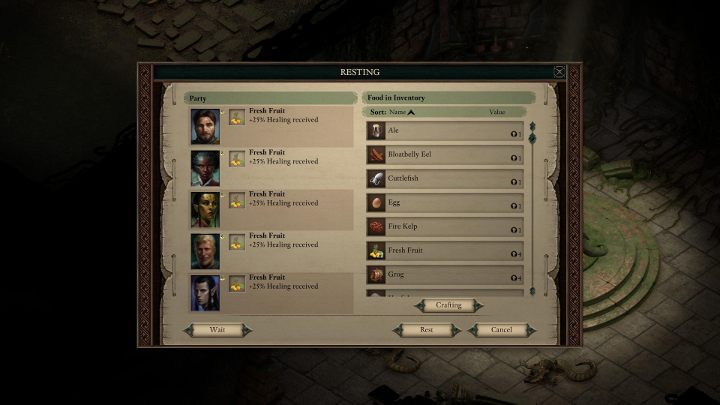
Finally, the battle is over, but your characters have seen better times and have many negative effects on them. Time to rest. Where can you do that? First of all, in inns, but it is also possible, sometimes, to sleep in a village, at one of the villagers' place. A comfortable bed will quickly heal all the injuries.
There is another option that you can use outside of villages and cities, which is resting in an encampment. Press "R", or click on the bonfire icon. In this case, you should have some food on you and place it in the slot next to the character's icon - depending on the food, the character may heal faster and receive additional effects.
To learn more about resting, see the FAQ page "How and where to rest?".
A handful of combat tips:
- Defend the weak - especially when playing at high difficulty levels. The enemies try to interrupt your characters' abilities, focus their attacks on the priests, and stun the wizards. First, tend to the weakest among your characters and do not allow the opponents to attack them.
- Select the right team - consider assembling a classic team comprising: a close combat unit, a priest, a wizard, a thief, and e.g. a chanter. The last two can be equipped with close / ranged combat weapons and react in accordance with enemy type.
- Surprise your enemy - it is a good idea to have a character on your team, who can set up traps and deal significant damage while remaining hidden from enemy sight. Consider using this before difficult fights.
- Use your abilities - this sounds easy enough, nonetheless, in combat, you might forget about some of the abilities you can use. Cast spells whenever you can.
- Watch out for the area of the attack - some spells and abilities work in a given area. Should your allies enter this area, they receive damage.
- Use consumables - before difficult battles brew a powerful potion or e.g. craft a handful of bombs.
- ...and perhaps a bit of diplomacy? - many battles can be avoided, as your characters can bluff, intimidate, use diplomacy, and bribe. If a given battle is too difficult, try avoiding it!
You are not permitted to copy any image, text or info from this page. This site is not associated with and/or endorsed by the Versus Evil or Obsidian Entertainment. All logos and images are copyrighted by their respective owners.
Copyright © 2000 - 2025 Webedia Polska SA for gamepressure.com, unofficial game guides, walkthroughs, secrets, game tips, maps & strategies for top games.
